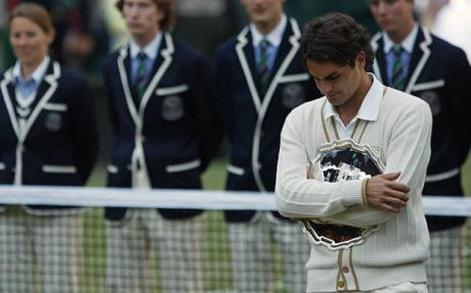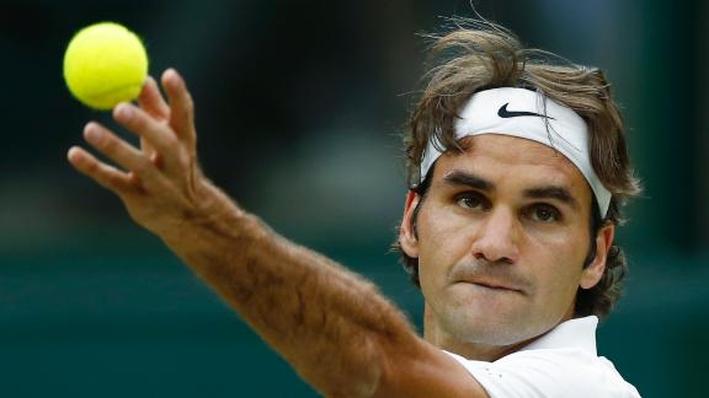Why 32-year-old Roger Federer is still the king of tennis’s most prestigious venue regardless of last Sunday’s Wimbledon Final result.
By Drew Vandemore
Guest Columnist
He wasn’t always like this. Coming up through the ranks and qualifying tournaments, Roger Federer was once an out-of-control brat with an Agassi maturity and a McEnroe temper.
He donned rebellious long hair in a ponytail when he beat defending champion Pete Sampras at age 19 in 2001 during the Fourth Round at Wimbledon. Viewers saw the talent the young star possessed, but most wondered whether he would be able to adapt the mentality that makes the greats of this game so hard to beat. Andy Roddick didn’t have it, for instance. While he consistently was able to get deep into majors during his playing career, Roddick was never able to develop the mental aspect of the game that is so critical in order to take the step from star to superstar. But why is this mentality so important?
It's because tennis is so much different from other sports in that whatever happens on the court falls solely on the individual's shoulders. There are no teammates to blame. There are no bad coaching decisions. There are no improper substitutions. And this is what makes tennis so exhilarating to watch. Not only can matches go 5+ hours in time, but there are so many emotional swings that each player must overcome in order to win a grand slam title.
By Drew Vandemore
Guest Columnist
He wasn’t always like this. Coming up through the ranks and qualifying tournaments, Roger Federer was once an out-of-control brat with an Agassi maturity and a McEnroe temper.
He donned rebellious long hair in a ponytail when he beat defending champion Pete Sampras at age 19 in 2001 during the Fourth Round at Wimbledon. Viewers saw the talent the young star possessed, but most wondered whether he would be able to adapt the mentality that makes the greats of this game so hard to beat. Andy Roddick didn’t have it, for instance. While he consistently was able to get deep into majors during his playing career, Roddick was never able to develop the mental aspect of the game that is so critical in order to take the step from star to superstar. But why is this mentality so important?
It's because tennis is so much different from other sports in that whatever happens on the court falls solely on the individual's shoulders. There are no teammates to blame. There are no bad coaching decisions. There are no improper substitutions. And this is what makes tennis so exhilarating to watch. Not only can matches go 5+ hours in time, but there are so many emotional swings that each player must overcome in order to win a grand slam title.
Federer looked on in astonishment. His throne as not only the King of Wimbledon was in trouble, but also his status as the greatest in the game. | I vividly remember watching Roddick’s fourth round match at the 2009 French Open against Gael Monfils. Roddick (Who was trailing in not only the third set but also the entire match) was consistently whining to the chair umpire that he could not see the ball on the court and that he wanted play suspended. The umpire refused to suspend play and Roddick ended up losing to the Frenchman. Superstars will put up with dim light while others find reasons to complain. |
The 2008 Wimbledon Final between Rafael Nadal and Federer is a great example of this. Considered one of the best finals in grand slam history, Nadal and Federer battled on Centre Court for almost 5 hours. Federer was chasing greatness – an unprecedented sixth Wimbledon title in a row. Nadal was looking to break through at Wimbledon and earn a grand slam title at a venue other than Roland Garros in, which would validate his status as a serious challenger to Federer’s throne as the best in the sport.
The duo battled back and forth, with each player raising their quality of play as the number of sets grew larger. The light grew dimmer and dimmer and yet neither player wanted to stop. The quality of the match superseded any sort of trivial annoyance like dim light. Both players just wanted to finish the match then and there.
Nadal emerged victorious from the match when Federer’s forehand hit the top of the net after a brief rally on match point. Nadal fell to his knees. Federer looked on in astonishment. His throne as not only the King of Wimbledon was in trouble, but also his status as the greatest in the game.
And yet something odd happened. Federer handled the situation with absolute class, congratulating his opponent on an incredible match and saying that Nadal earned the win. This was when I truly realized just how great Federer was. He had to be absolutely heartbroken, incredibly frustrated, and every other emotion in between. Yet he was able to put his own emotions aside to congratulate an opponent who had just stolen the show at his sanctuary.
The duo battled back and forth, with each player raising their quality of play as the number of sets grew larger. The light grew dimmer and dimmer and yet neither player wanted to stop. The quality of the match superseded any sort of trivial annoyance like dim light. Both players just wanted to finish the match then and there.
Nadal emerged victorious from the match when Federer’s forehand hit the top of the net after a brief rally on match point. Nadal fell to his knees. Federer looked on in astonishment. His throne as not only the King of Wimbledon was in trouble, but also his status as the greatest in the game.
And yet something odd happened. Federer handled the situation with absolute class, congratulating his opponent on an incredible match and saying that Nadal earned the win. This was when I truly realized just how great Federer was. He had to be absolutely heartbroken, incredibly frustrated, and every other emotion in between. Yet he was able to put his own emotions aside to congratulate an opponent who had just stolen the show at his sanctuary.
 Federer after his dramatic 2008 loss to the young up-and-coming Nadal. (Photo: Reuters)
Federer after his dramatic 2008 loss to the young up-and-coming Nadal. (Photo: Reuters) He has what could be considered the best endorsement deals in all of sports (Consisting of a Mercedes Benz, Rolex, and more). He has the most majors out of any active player. He’s tied with Pete Sampras for the record of most Wimbledon titles with seven. Could anyone blame him for being cocky if he wanted to be? Could that be what tennis needs?
If you look at the women’s side of things, Serena Williams is about as opposite in terms of personality as you can get from Federer. She regularly fails to give credit to her opponents in post match interviews after losses, has seen her level of play subside substantially this season in majors (Serena hasn’t made it past the third round of a grand slam in 2014), and is now notoriously known for almost ripping off a ball person’s head at the 2009 US Open. Federer’s class makes him the favorite of many tennis aficionados, while Serena’s attitude has turned off at least this fan from wanting her to do well in any tournament.
But what does this have anything to do with Federer dominating at one of the most hallowed grounds in all of professional sports? Without an attitude change and a large growth in the maturity department, Federer would not have been able to make the leap from star to superstar that any athlete must eventually make.
Look at the NBA, a league designed around the progress of superstars, and someone like Michael Beasley for instance. While the former No. 2 overall pick possesses all the talent in the world, he has had a hard time sticking to one NBA roster because of his attitude problems. He lets his selfishness (Among many other things, but we’ll stick with selfishness to be nice) get in the way of greatness.
Federer grew up. He cut his hair. He got married. And he is now the ideal tennis superstar: Elegant and classy while being extremely interactive and kind with fans. Federer earned a chance at an 8th Wimbledon title on Sunday not only through his play on the court, but for his actions off of it. Despite falling to Novak Djokovic in five epic sets, Federer further cemented his spot at the top of tennis’ greatest venue by hitting awe inspiring shots during the match and handling himself with an unrivaled level of class when it was all over.
Federer may or may not ever win another Wimbledon or grand slam title. But when looking back on his career it is clear that Federer not only graced us with beautiful tennis, but also with the class and elegance of a true gentleman.
If you look at the women’s side of things, Serena Williams is about as opposite in terms of personality as you can get from Federer. She regularly fails to give credit to her opponents in post match interviews after losses, has seen her level of play subside substantially this season in majors (Serena hasn’t made it past the third round of a grand slam in 2014), and is now notoriously known for almost ripping off a ball person’s head at the 2009 US Open. Federer’s class makes him the favorite of many tennis aficionados, while Serena’s attitude has turned off at least this fan from wanting her to do well in any tournament.
But what does this have anything to do with Federer dominating at one of the most hallowed grounds in all of professional sports? Without an attitude change and a large growth in the maturity department, Federer would not have been able to make the leap from star to superstar that any athlete must eventually make.
Look at the NBA, a league designed around the progress of superstars, and someone like Michael Beasley for instance. While the former No. 2 overall pick possesses all the talent in the world, he has had a hard time sticking to one NBA roster because of his attitude problems. He lets his selfishness (Among many other things, but we’ll stick with selfishness to be nice) get in the way of greatness.
Federer grew up. He cut his hair. He got married. And he is now the ideal tennis superstar: Elegant and classy while being extremely interactive and kind with fans. Federer earned a chance at an 8th Wimbledon title on Sunday not only through his play on the court, but for his actions off of it. Despite falling to Novak Djokovic in five epic sets, Federer further cemented his spot at the top of tennis’ greatest venue by hitting awe inspiring shots during the match and handling himself with an unrivaled level of class when it was all over.
Federer may or may not ever win another Wimbledon or grand slam title. But when looking back on his career it is clear that Federer not only graced us with beautiful tennis, but also with the class and elegance of a true gentleman.
Drew Vandemore is a senior natural resource economics major at the University of Connecticut. He lives in Charlotte, N.C. and spends his free time playing basketball and relaxing with his family. Follow Drew on Twitter @scoopdadoop and contact him at drew.vandemore@uconn.edu.

 RSS Feed
RSS Feed